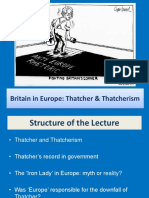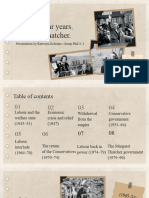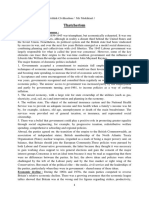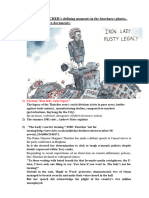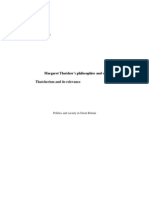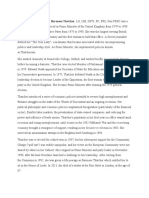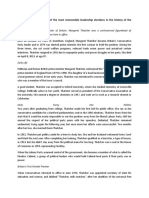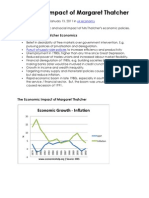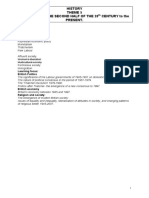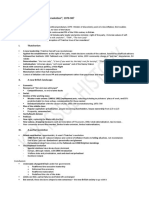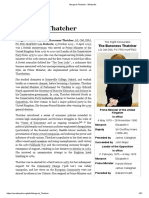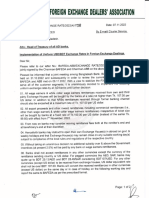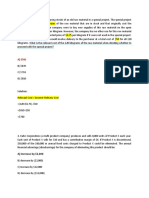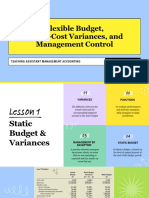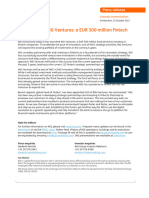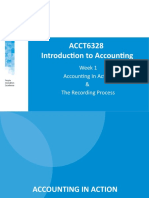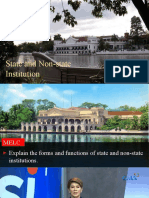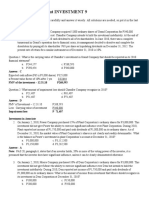Thatcherism and State Intervention
Aim: Reason: Method:
End Corporatism Corporatism is when the government negotiates with Government abandoned prices and income policies 1979
various vested interests such as business and unions in and stopped negotiating with major unions regarding
order to create a common policy on pay, prices and economic policy.
industrial development. Norman Tebbit, Thatcher’s
Secretary of State for Trade and Industry, argued that this The department for trade industry was recognised
was undemocratic; Thatcher believed it stifled innovation specifically to break its links with the confederation of
and that businesses should be freed to grow and be british industry.
entrepreneurial.
End Keynesianism Keynesian economic policies had involved cutting taxes and Budgets cut spending to reduce inflation, tax cuts and
increase in spending to stimulate the economy in periods of manipulated interest rates to stimulate growth and control
slow growth. There was also a commitment to full inflation.
employment.
Government uses monetary policy rather than taxation and
Thatcher believed this was wrong as it led to high inflation spending to influence the direction of the economy.
and interfered with the free market.
End Union power Rather than negotiate with the unions, the Thatcher Employment act 1980 criminalised secondary action,
government sought to control them. She viewed them as including secondary picketing
the ‘enemy within.’
Employment act 1982 changed law so union leaders could
only impose a closed shop in an industry if they had the
backing of a majority of their members in a secret ballot
Trade union act 1984 forced unions to call a secret ballot
and win a majority of support prior to starting strike action
Strengthen Defence A strong defence policy was important to Thatcher. She 1979 allowed US cruise missiles to be stationed on British
was committed to acting powerfully when challenged by territory, believing it would deter aggression from the Soviet
1
� Thatcherism and State Intervention
another state. Wanted to give a clear show of strength to Union and its allies.
the USSR to deter them from military action.
1980 bought trident, major nuclear weapons, £7.5 billion
per year for the first 15 years. Believed this would deter a
Soviet invasion.
Approved complex military operation to retake Falklands
Islands
Defence spending rose by 20% 1979 - 1986, however 1984-
86 18,000 troops were made redundant, resulting in overall
defence spending 1979-89 falling by 7%.
Strengthen Law and Order Thatcher extended police powers. Muggings in London and
Brixton riots were used to justify increased police power.
Mugging is the violent robbery of an individual in a public
place; this crime was connected by social commentators to
the black community.
Violence on the picket lines.
Needed to control the discontent created by the new
economic policies – mass unemployment, widening social
inequality.
Feared Soviet infiltration of Government Communications
Head Quarters (GCHQ). She also viewed union members as
the ‘enemy within’. As socialist organisations, she thought
they might have Soviet sympathies.
Zircon Affair – banned a television documentary relating to
secret spy satellite codenamed Zircon. When the journalist,
Duncan Campbell, then gave his story to the Observer
2
� Thatcherism and State Intervention
newspaper his office was raided and his work confiscated
by the police. Yet his work had revealed that even
Parliament did not know about Zircon; this is
unconstitutional.
Government also sought to control the media:






